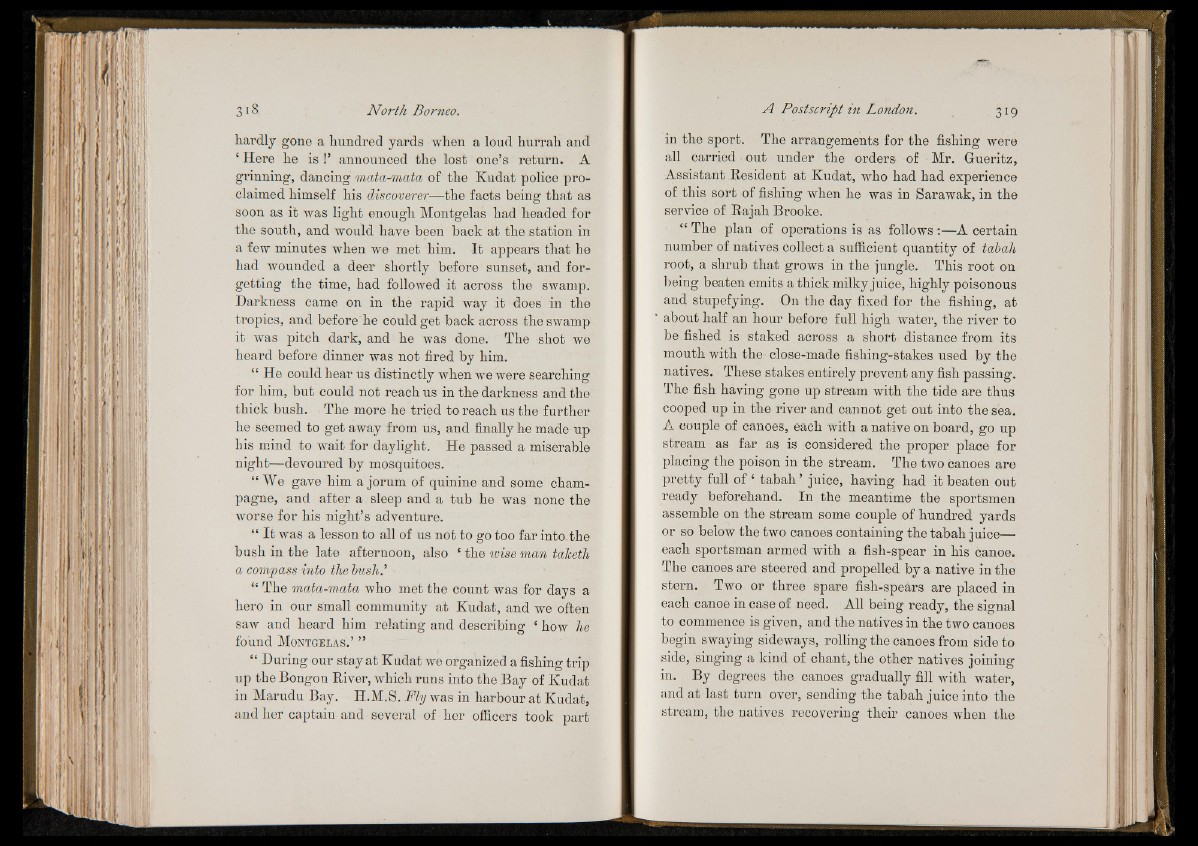
hardly gone a hundred yards when a loud hurrah and
‘ Here he is !’ announced the lost one’s return. A
grinning, dancing mata-mata of the Kudat police proclaimed
himself his discoverer—the facts being that as
soon as it was light enough Montgelas had headed for
the south, and would have been back at the station in
a few minutes when we met him. It appears that he
had wounded a deer shortly before sunset, and forgetting
the time, had followed it across the swamp.
Darkness came on in the rapid way it does in the
tropics, and before he could get back across the swamp
it was pitch dark, and he was done. The shot we
heard before dinner was not fired by him.
“ He could hear us distinctly when we were searching
for him, but could not reach us in the darkness and the
thick bush. The more he tried to reach us the further
he seemed to get away from us, and finally he made up
bis mind to wait for daylight. He passed a miserable
night—devoured by mosquitoes.
“ We gave him a jorum of quinine and some champagne,
and after a sleep and a tub he was none the
worse for his night’s adventure.
“ I t was a lesson to all of us not to go too far intathe
bash in the late afternoon, also ‘ the wise man talceth
a compass into the bush.’
“ The mata-mata who met the count was for days a
hero in our small community at Kudat, and we often
saw and heard him relating and describing ‘ how he
found M ontgelas.’ ”
“ During our stay at Kudat we organized a fishing trip
up the Bongon River, which runs into the Bay of Kudat
in Marudu Bay. II.M.S. Fly was in harbour at Kudat,
and her captain and several of her officers took part
in the sport. The arrangements for the fishing were
all carried out under the orders of Mr. Gueritz,
Assistant .Resident at Kudat, who had had experience
of this sort of fishing when he was in Sarawak, in the
service of Rajah Brooke.
“ The plan of operations is as follows :—A certain
number of natives collect a sufficient quantity of tabah
root, a shrub that grows in the jungle. This root on
being beaten emits a thick milky juice, highly poisonous
and stupefying. On the day fixed for the fishing, at
about half an hour before full high water, the river to
be fished is staked across a short distance from its
mouth with the close-made fishing-stakes used by the
natives. These stakes entirely prevent any fish passing.
The fish having gone up stream with the tide are thus
cooped up in the river and cannot get out into the sea.
A couple of canoes, each with a native on board, go up
stream as far as is considered the proper place for
placing the poison in the stream. The two canoes are
pretty full of ‘ tabah ’ juice, having had it beaten out
ready beforehand. In the meantime the sportsmen
assemble on the stream some couple of hundred yards
or so below the two canoes containing the tabah juice—
each sportsman armed with a fish-spear in his c.anoe.
The canoes are steered and propelled by a native in the
stern. Two or three spare fish-spears are placed in
each canoe in case of need. All being ready, the signal
to commence is given, and the natives in the two canoes
begin swaying sideways, rolling the canoes from side to
side, singing a kind of chant, the other natives joining
in. By degrees the canoes gradually fill with water,
and at last turn over, sending the tabah juice into the
stream, the natives recovering their -canoes when the